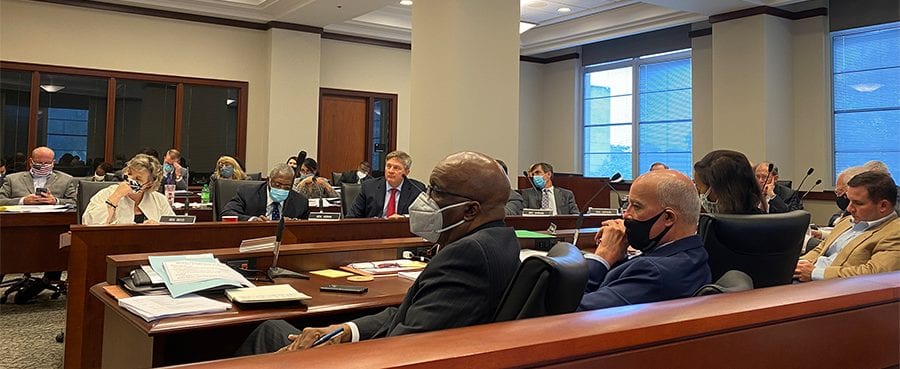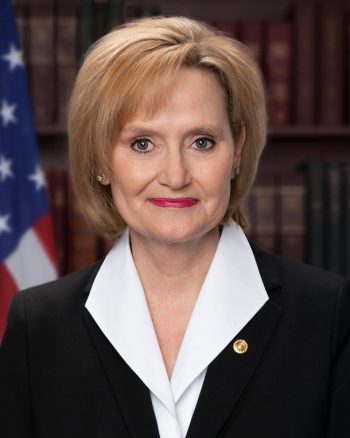
Legislative Budget Hearings were held on Thursday in Jackson. Several of the state agencies appeared before the Lt. Governor, Speaker and members to present their budget requests for FY 2022.
The Department of Public Safety
DPS requested $97,291,995 for the FY 2022 year from the Legislature. Their actual expenses of FY 2020 were at $95.5 million and the estimated expenses of FY 2021 were put at just over $91.5 million. They have an overestimate for FY 2021 of $5.8 million.
There are a total of 506 sworn officers between Highway Patrol enforcement, Mississippi Bureau of Investigation, Administration, Driver Services, Mississippi Bureau of Narcotics and the MLEOTA training facility.
They are currently working on several improvement projects, including building a new MLEOTA facility that is estimated to cost a total of $4.3 million by completion. DPS is currently finalizing construction documents with the Department of Finance and Administration.
The Legislature awarded $4 million in HB 1730 for the MHP Troop G in Starkville for a new facility. The estimated cost of the building is $7.5 million.
 Mississippi Department of Corrections
Mississippi Department of Corrections
MDOC requested $364,776,348 for FY 2022. At the top of their list of priorities is the completion of the Walnut Grove facility project.
Commissioner Burl Cain said they do plan to be finished with the project by December 15, 2020. They plan to first move the 580 inmates currently being housed at Tutweiler, a private facility, into Walnut Grove as soon as possible.
The facility will house roughly 1,800 individuals at capacity.
The original contractor estimated a $10 million cost for the repair and revitalization of the Walnut Grove facility, however MDOC chose a different route which includes using inmate labor for the construction. They now believe they will finish the project at or around $1.2 million. They have currently spent $650k for repairs.
“We are going to be frugal and cut everywhere we can,” said Cain.
Since his appointment to the department, his mission has been to bring “morality” to inmates by introducing faith programs which he believes will encourage them toward rehabilitation and life change choices.
Mississippi Department of Employment Security
While MDES is a federally funded program, they can sometimes have budget requests which are considered special funding by the Legislature.
This year, Director Jackie Turner said they are requesting $174,076,000 for FY 2022. Part of that funding will go to additional employment up to $1.6 million, as well as $41,250 for the replacement of vehicles that fall within the DFA category.
There is currently $422 million in the MDES Trust Fund and over $400 million spent. It was beefed up by an appropriation of $181 million given by the Legislature. Since March of 2020, through the end of September, they have given out $3,187,000,000 through all the active programs available to Mississippians.
Turner anticipates that they will continue seeing $9 to $10 million a week going out through claims until the end of the year. MDES estimates $18 to $19 million will come in during the third quarter and $11 million for the fourth quarter, roughly $30 million in income. This would decrease the trust fund by about $90 million by the end of the year.
They have seen 550,000 claims since COVID-19 hit, where they were only seeing 1,000 a week in the state. Turner said they are still seeing roughly 23 percent of filings, which is around 125,000 claims.
The current unemployment rate in the state is at 7.9 percent.
Mississippi Division of Medicaid
Medicaid is asking the Legislature for $898,676,959 for FY 2022, which is a decrease of over $496,000 from last year. It also marks the second potential consecutive year that Medicaid has requested and used under $900 million in state dollars.
Over two years ago, the division was requesting over a billion dollars in state funds. There are currently over 760,000 Mississippians enrolled on Medicaid.
Seventh-seven percent of Medicaid funding is provided through the federal government. Direct state support amounts to 14 percent and the rest is split between hospital assessments, other state agencies, long term care provider assessments, drug rebates and other sources.
Their total funding amount for FY 2022 is estimated at $6.4 million.
With the current COVID-19 pandemic, Medicaid has received additional drawdown dollars from the federal government, which has also given providers some relief during FY 2021. States were required to maintain everyone that was enrolled as of March 18, 2020, in order to get these additional dollars.
Snyder said, while things look stable currently that could deteriorate quickly and leave impacts on FY 2022 and FY 2023. He said those changes could come from the end date on some of the dollars appropriated by the federal government and a downtick in enrollment.
They expect to see that downtick begin in January of 2021. This, however, could also decrease expenditures.
Mississippi Department of Education
The Department of Education made an ask of $2,857,705,090 for FY 2022 which is a 10.87 percent increase over the FY 2021 appropriation. That amount would put over $283 million into MAEP with nearly $28 million going toward general education, vocational education, Chickasaw and MSBD.
Under this request they would also receive $868,877,156 from federal or other special funds.
There are roughly 490,000 Mississippi public school students and 38,000 teachers, according to MDE. This does not include assistant teachers.
Dr. Carey Wright said the Early Learning collaborative was one of the department’s greatest successes over the last year. In the 2019 assessment of kindergarten readiness among students in the Early Learning Collaborative, it showed that all collaboratives achieved the target score that indicates students are ready for kindergarten.
MDE has requested an increase in the Modernize Mississippi Student Information System (MSIS) to $8.9 million, a $5.5 million increase over FY21. There was also a $2 million increase request for expansion of Early Childhood Education Programs to $9.7 million.
For secondary education, middle and high school innovation and redesign, MDE made a request of $460,000, which is $98,000 over the FY21 ask. Wright says these funds will support districts with innovation implementation and early college programs. The department made other increases, as well as asking for the full funding of MAEP at just over $2.5 billion.
Wright gave an update on the implementation of SB 3044, which established the Equity in Distance Learning Grant Program, with $150 million to assist public schools in implementing distance learning. One hundred and forty-eight districts applied to participate in this program and were given options for Apple or Windows/Chrome devices with professional development, insurance, security and support.
As well as, HB 1788 which provided $50 million in the Mississippi Pandemic Response Broadband Availability Grant Program to provide grants to public schools, independent schools and Native American tribal schools for expanding broadband access in underserved areas. This will give broadband access to 75% of public-school households.
MDE estimates the base student cost for FY 2022 is $5,867.80. Average teacher salaries in Mississippi are between $45,000 and $50,000 which is roughly $6,000 below the Southeastern average and closer to $15,000 short of the United States average.















